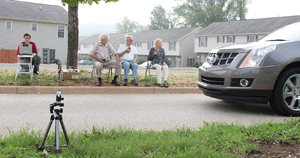Low vision specialist Shirin E. Hassan, B.App.Sc.(Optom.), Ph.D., assistant professor at Indiana University School of Optometry, has secured a $1.9 million grant from the National Institutes of Health to evaluate a street-crossing program for visually impaired pedestrians.

Low-vision optometrist Shirin E. Hassan, far left, monitors the responses of elderly pedestrians during street-crossing decision-making experiments.
With this funding, Dr. Hassan will investigate the effectiveness of an established orientation and mobility street-crossing training program.
Specifically, she intends to improve the overall safety of high-risk pedestrians, such as the elderly, visually impaired and/or blind.
“To support older adults and help them cope with the changes of aging—in particular with visual impairments and blindness—there needs to be increased effort to improve pedestrian safety that will maximize an individual’s independence and quality of life,” Dr. Hassan says. “Having successfully secured funding, I can now determine whether or not a street-crossing training program provides an older adult with low vision with enough scope and skill to cross a street confidently and safely.”
Dr. Hassan will also conduct a series of street-crossing experiments in realistic, outdoor traffic simulations during the next five years. “When making street-crossing decisions, if pedestrians do not take into account their reduced vision and slow walking speed, we might expect to see a corresponding decrease in their decision-making accuracy and/or reliability,” Dr. Hassan says.
She anticipates that her evidence-based research and subsequent clinical recommendations will help low vision optometrists and visual rehabilitation specialists determine if and when they should refer their patients for orientation and street-crossing training.
Currently, Dr. Hassan is seeking study participants age 65 and older, irrespective of visual status. For more information, visit www.opt.indiana.edu/People/HassanStudy.aspx.

